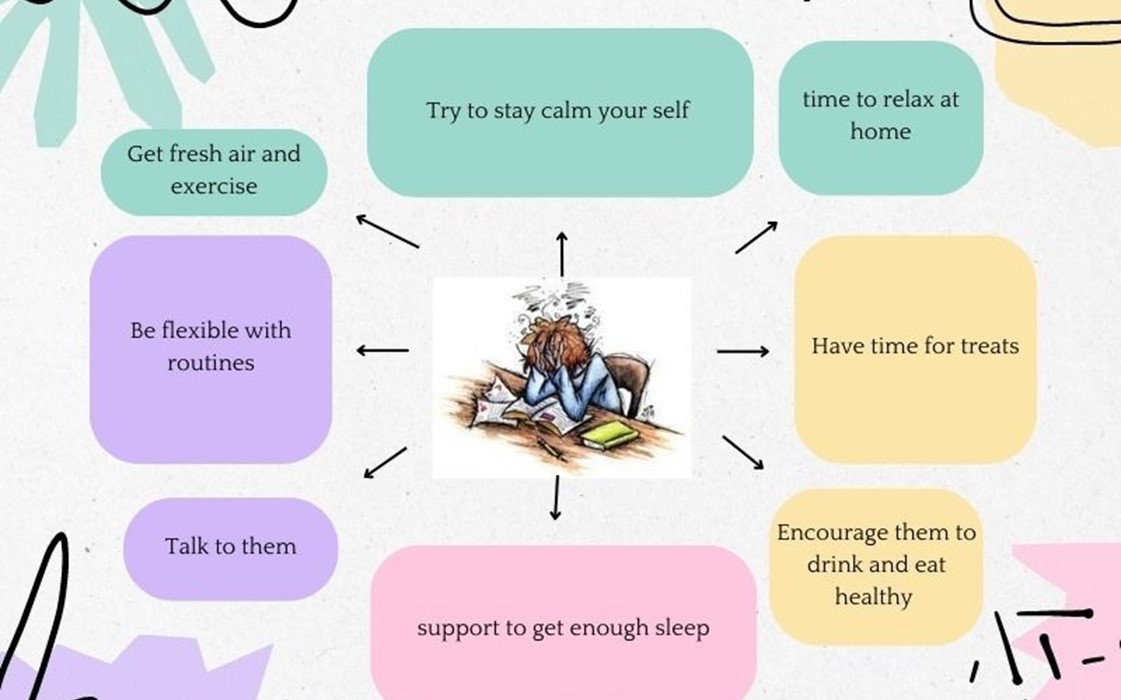- Local Offer Home
- Local Offer News
- Exam Support
Exam Support
In the coming weeks many children in primary schools/high schools and college in England will be taking their exams.
Children will rarely say ‘I feel stressed about my exams next week!’. It is very unlikely a child will recognise and tell you they are stressed! Instead, they are mostly likely to show you through behaviour and emotional cues, though they may, if you are lucky, talk to you about their worries.
However, other signs you may notice are:
- They may be unusually moody, angry, or withdrawn, they may complain, cry or find it difficult to sleep (or sleep a lot) or have nightmares, their appetite might seem better or worse than usual.
- Negative changes in behaviour are a real cue that something is wrong. If a usually happy, chilled out child becomes angry, withdrawn, or upset then it’s worth taking the time to chat to them and explore further.
- Stress can often show itself in physical ways. Complaints of tummy aches or upsets, feeling sick or headaches are a classic sign. Some children cannot explain how they feel ill, they just do. In a busy world with work/appointments to get to it can be frustrating for a parent not to have something to “put their finger on”. A hug (if they allow it) and a chat might sometimes be all that is needed.
- Sometimes when feeling under stress children can find it difficult to make even, what seems like, the simplest of decisions. They might be appearing to dawdle over what to wear, what book to choose, what snack they want. If this is unusual for them it is sometimes helpful to reduce the number of options or guide them more than they might normally need.
So we have some useful tips and links to other websites to help.

Talk about stress & worry
- Remind your child that it's normal to feel worried, this is a natural reaction.
- If anxiety is getting in the way rather than helping, encourage your child to practise the activities they'll be doing on the day of the test. This will help it feel less scary.
- For example, this may involve practicing the things that might come up . School staff should be able to help with this.
- Help your child face their fears and see these activities through, rather than avoiding them.
- Encourage them to think about what they know to help them feel more confident.
Ensuring a healthy diet
- A balanced diet is vital for your child's health, and can help them feel well during the SATs period.
- Some parents find high-fat, high-sugar and high-caffeine foods and drinks, such as energy drinks, cola, sweets, chocolate, burgers and chips, make their children hyperactive, irritable and moody.
- Make sure they have had breakfast on the days of the SATs will help the children to focus.
Supporting good sleep
- Good sleep improves thinking and concentration.
- Most children need 9 to 12 hours' sleep a night.
- Allow half an hour or so for your child to wind down between studying, watching TV or using a computer and going to bed, to help them get a good night's sleep.
Encourage exercise
- Getting out in the fresh air to play or do family activities can help to ease any worries and give the brain and body time to recharge.
Be flexible
- Be flexible around SATs time, your child may feel extra tired and not want to participate in their usual activities.
Make time for treats
- With your child, think about rewards for the end of SATs
- Rewards do not need to be big or expensive. They can include simple things like making their favourite meal staying up later at the weekend or having a day out
Here are some useful websites and resources relating to stress and how to support your child through the exams
5 Ways to support autistic students (opens link in new window)
The stress booklet (opens link in new window)
Barnardo's exam stress toolkit (opens link in new window)
Top 10 ways to calm your child's fears about SATs | TheSchoolRun (opens link in new window)
Top 10 ways to calm your child's fears about SATs | TheSchoolRun (opens link in new window)

Leave a comment